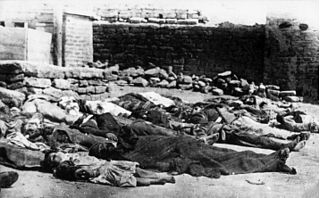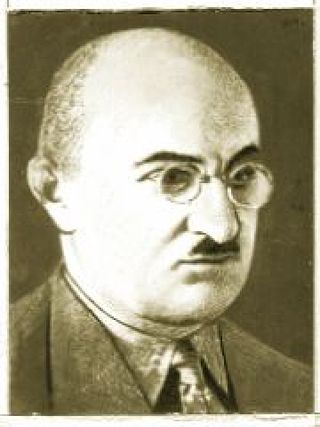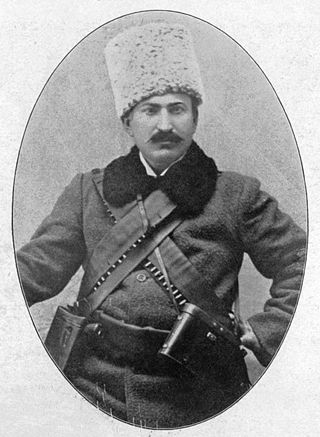
Grigory Nikolayevich Korganov (Korganian, Korganashvili) (July 30, 1886 - September 20, 1918) was a Georgian-Armenian Communist activist, one of the 26 Baku Commissars and Bolshevik Party leaders in Azerbaijan during the Russian Revolution.

Grigory Nikolayevich Korganov (Korganian, Korganashvili) (July 30, 1886 - September 20, 1918) was a Georgian-Armenian Communist activist, one of the 26 Baku Commissars and Bolshevik Party leaders in Azerbaijan during the Russian Revolution.
Korganov was born in Tiflis in the Armenian family of a military officer. From 1907 he attended the Moscow University and headed the Caucasian student association, but he was expelled due to his revolutionary work. After finishing the studies in 1914, he served in the Army as an officer during World War I and was sent to Caucasian Front where he conducted revolutionary propaganda.
After the October Revolution he became Chairman of the Revolutionary Army in Caucasus and, from March 1918, member of the Committee of the Revolutionary Defense of Baku. From April 1918 he became Commissar of the Naval Matters of the Baku Commune and from the spring of 1918 he headed the Soviet Armed Forces. When the Commune was toppled by the Centro Caspian Dictatorship, a British-backed coalition of Dashnaks, SRs and Mensheviks, Korganov and his comrades were captured by British troops and executed by a firing squad between the stations of Pereval and Akhcha-Kuyma of Transcaucasian Railroad.


Stepan Georgevich Shaumian was an Armenian Bolshevik revolutionary and politician active throughout the Caucasus. His role as a leader of the Russian Revolution in the Caucasus earned him the nickname of the "Caucasian Lenin", a reference to Russian revolutionary leader Vladimir Lenin.

Mahammad Amin Akhund Haji Molla Alakbar oghlu Rasulzade was an Azerbaijani politician, journalist and the head of the Azerbaijani National Council. He is mainly considered the founder of Azerbaijan Democratic Republic in 1918 and the father of its statehood. His expression "Bir kərə yüksələn bayraq, bir daha enməz!" became the motto of the independence movement in Azerbaijan in the early 20th century.

The Azerbaijan Democratic Republic, also known as the Azerbaijan People's Republic, was the first secular democratic republic in the Turkic and Muslim worlds. The ADR was founded by the Azerbaijani National Council in Tiflis on 28 May 1918 after the collapse of the Transcaucasian Democratic Federative Republic, and ceased to exist on April 28, 1920. Its established borders were with Russia to the north, the Democratic Republic of Georgia to the north-west, the Republic of Armenia to the west, and Iran to the south. It had a population of around 3 million. Ganja was the temporary capital of the Republic as Baku was under Bolshevik control. The name of "Azerbaijan" which the leading Musavat party adopted, for political reasons, was, prior to the establishment of the Azerbaijan Democratic Republic in 1918, exclusively used to identify the adjacent region of contemporary northwestern Iran.

The Islamic Army of the Caucasus was a military unit of the Ottoman Empire formed on July 10, 1918. The Ottoman Minister of War, Enver Pasha, ordered its establishment, and it played a major role during the Caucasus Campaign of World War I.

Mashadi Azizbey oghlu Azizbeyov, also spelled Azizbekov was a Soviet revolutionary of Azerbaijani origin, leader of the revolutionary movement in Azerbaijan, one of the first Azeri Marxists, Provincial Commissioner and Deputy People's Commissar of Internal Affairs, gubernial commissar for Baku. He was one of the 26 Baku Commissars.

The March Days or March Events was a period of inter-ethnic strife and clashes which took place between 30 March – 2 April 1918 in the city of Baku and adjacent areas of the Baku Governorate of the Transcaucasian Commissariat.

Prokofy "Alyosha" Aprasionovich Dzhaparidze or Japaridze,, was a Bolshevik revolutionary of Georgian origin. He was one of the leaders of the Red Army and the Bolshevik Party in Azerbaijan during the Russian Revolution.

Ivan Timofeevich Fioletov was a Russian revolutionary activist and one of the Bolshevik Party leaders in Azerbaijan during the Russian Revolution.

Hamazasp "Hamo" Ohanjanyan was an Armenian medical doctor, revolutionary, and politician of the Armenian Revolutionary Federation (ARF/Dashnaktsutiun). He served as the third Prime Minister of the First Republic of Armenia from May 5 to November 23, 1920.

The 26 Baku Commissars were Bolshevik and Left Socialist Revolutionary (SR) members of the Baku Commune. The commune was established in the city of Baku, which was then the capital of the briefly independent Azerbaijan Democratic Republic, and is now the capital of the Republic of Azerbaijan. The commune, led by Stepan Shahumyan, existed until 26 July 1918 when the Bolsheviks were forced out of power by a coalition of Dashnaks, Right SRs and Mensheviks.

Mir-Hasan Kazim oglu Vazirov, also spelled Vezirov was an Azerbaijani socialist revolutionary. Vazirov participated in revolutionary movements in the Russian Empire from his youth, for which he was persecuted by the authorities. Later on, he joined the Socialist-Revolutionary Party and became one of the 26 Baku Commissars. He is the great-grandson of Mirza Ali Muhammad Aga, vizier of Ibrahim Khalil Khan of Karabakh Khanate.

Yakov Davidovich Zevin was a Russian revolutionary activist and one of the Bolshevik Party leaders in Azerbaijan during the Russian Revolution. Zevin was born in Krasnapolle, a town in nowadays Mahilyow Voblast, Belarus. He became a member of Russian Social Democratic Labour Party in 1904 and he was arrested several times for conducting revolutionary activities.

The Battle of Baku took place in August and September 1918 between the Ottoman–Azerbaijani coalition forces led by Nuri Pasha and Bolshevik–ARF Baku Soviet forces, later succeeded by the British–Armenian–White Russian forces led by Lionel Dunsterville and saw Soviet Russia briefly re-enter the war. The battle took place during World War I, was a conclusive part of the Caucasus Campaign, but a beginning of the Armenian–Azerbaijani War.

Grigory Constantinovich Petrov was a Russian Left Socialist-Revolutionary activist in Baku, Azerbaijan, during the Russian Civil War. Petrov became one of the 26 Baku Commissars of the Soviet Commune that was established in the city after the October Revolution. He was the Military Commissar of the Baku region. When the Commune was toppled by the Centro Caspian Dictatorship, a British-backed coalition of Dashnaks, SRs and Mensheviks, Petrov and his comrades were captured by British troops and executed by a firing squad between the stations of Pereval and Akhcha-Kuyma of Transcaucasian Railroad on the night of 20 September 1918.

The German Caucasus expedition was a military expedition sent in late May 1918, by the German Empire to the formerly Russian Transcaucasia during the Caucasus Campaign of World War I. Its prime aim was to stabilize the pro-German Democratic Republic of Georgia and to secure oil supplies for Germany by preventing the Ottoman Empire from gaining access to the oil reserves near Baku on the Absheron Peninsula.

Askanaz Harutyuni Mravyan was a Soviet Armenian statesman and political activist. He was one of the early leaders of Soviet Armenia.

Meyer Velkovich Basin was a member of the Military Revolutionary Committee of the Caucasian Army.

Hamazasp Srvandztyan, commonly known as Hamazasp, was an Armenian fedayee military commander and member of the Armenian Revolutionary Federation.

The Battle of Goychay or Raid on Goychay, was a series of clashes that took place from 27 June to 1 July 1918, between Ottoman–Azerbaijani coalition forces led by Nuri Pasha and a coalition of the Soviet 11th Army and Armenian Dashnak forces. The initial battle ended on 30 June, but minor clashes continued until 1 July. Despite being outnumbered six to one, the Central Powers were able to defeat the Armenian–Soviet forces before they reached Ganja, the headquarters of the Ottoman Islamic Army of the Caucasus. The Ottoman–Azerbaijani forces seized control of the lands from Goychay to Shamakhi. Armenian–Soviet rule in the region ended as a result of the battle.
With the outbreak of hostilities in the Caucasus as part of World war I, Azerbaijan was also involved in the war, being part of the Russian Empire. Baku oil was of particular importance.